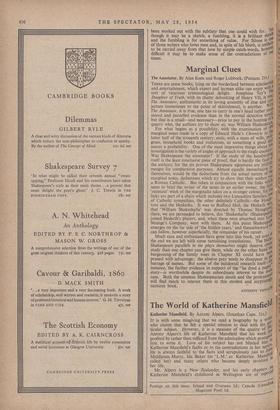Party and Church
By REX WARNER ILONE is too distinguished a writer to be treated with anything but respect; and so, before complaining of a kind of vagueness and imprecision which seem to mark new novel,* one should pause to wonder why it is that he chosen this method. it is a curiously cinematographic hod. The narrative proceeds in leaps and bounds and jerks, the jeep which is constantly being driven by the main racter; it goes forwards and backwards in time; incidents characters are explained long after or long before they e happened or appeared; and some incidents and characters not explained at all. It is not that the book is obscure or cult to read. Far from it. Nor do the actual 'sequences' rnselves lack definition. Every scene in this remote valley alabria is, as it were, well lighted and well directed. But, I have suggested, there seems to be no inevitability about cutting.' It is cleverly done, but it could have been done rently and just as cleverly. and church are themselves 'powers,' and power corrupts. The liberating spirit becomes an organisation, and organisa- tions, for their own security, will stamp out heresies. Yet power—organisation----is necessary. How can the contradic- tion be solved ? One solution seems to be this : to choose for One's hero either a bad Communist or a bad priest. Such a character can represent the goodness which lay, and perhaps still lies, behind the bad (but necessary) organisation; his own dilemma, like that of his creator, will make him unhappy; and his unhappiness will make him, if not a tragic, at least a sympathetic being. And yet it remains true that the solution (bad Communist or bad priest) is, to say the least, unsatisfactory. It can only be made at all credible by great skill in the author and by a state of general bewilderment in the mind of the reader. • Both conditions are often to be found, though the first of them is the rarer. And the author, though he may be the more skilful, will sometimes be equally bewildered with the reader. For what is he really at ? He is both for and against the govern- ment. He must believe and disbelieve with almost equal intensity in some system or authority, man-made for man. But behind the belief and the disbelief is his real faith. In man ? In God ? In anarchy ?
I have expressed most crudely and at too little length this real dilemma. So, I think, has Silone in his novel. His hero, the engineer Rocco, was a leader of partisans;. he travelled to Russia and to Poland; he saw things that he did not like, and he left the Party.' That is his whole point and it is not enough. We see him as a 'superior' man, a man of iron with occasional and rather irrelevant charm. We are encouraged to admire him because his girl .blindly worships him. But there is no good reason for this worship, except that he is an honest man. So are many others, and, in particular, so is a priest whose sympathies are wider than is conventional and so are the revolutionary workmen who do not belong to 'the Party.' Most admirable of all, in some ways, are the denizens of the Roadhouse, the thieves and outlaws, the real anarchists. been worked out with the subtlety that one could wish for. Y ift though it may be a sketch, a fumbling, it is a brilliant skeIC k and the fumbling is for something of value. For Silone is. on° , or of those writers who loves men and, in spite of his blurb, is unlikac to be carried away from that love by simple catch-words, howeve tic difficult it may be to make sense of the contradictions of (ng k times. w



































































 Previous page
Previous page